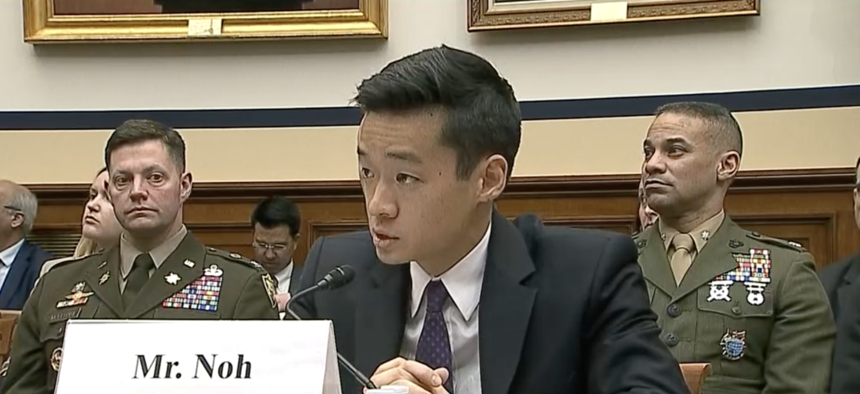
Senators across the political spectrum are worried the White House and Pentagon’s focus is drifting from the Indo-Pacific, leaving the U.S. vulnerable to China and other potential adversaries.
On Tuesday, lawmakers peppered John Noh, the Trump administration’s pick to lead the Pentagon’s Indo-Pacific affairs, with questions about his plans to restore confidence in the United States from its allies and partners in the region.
“The Chinese Communist Party, along with the nuclear-armed Russia and North Korea, pose a significant threat to the United States. The scale and scope of that threat put a premium on our alliances. In light of that, I’m disappointed with some of the decisions the department has made with respect to our allies in Japan, South Korea, Australia and Taiwan. A few of these choices have left me scratching my head,” said Sen. Roger Wicker, R-Miss., who leads the Senate Armed Services Committee.
Wicker pressed Noh to “inject more diplomatic skill and mutually beneficial approaches into our conversations with our close allies.”
Sen. Jack Reed, D-R.I., the committee’s ranking member, went further, saying the administration so far has “undermined years of progress with these allies, threatening troop withdrawals, scaling back joint exercises, imposing erratic tariffs and diverting our strategic forces to unrelated regions and even domestic military deployments. These actions weaken our deterrence and damage trust with our allies.”
Noh, the deputy assistant defense secretary for East Asia, repeatedly affirmed the Indo-Pacific’s strategic importance, vowing to deepen existing alliances with Japan, the Republic of Korea, Australia, and the Philippines.
“China is undergoing really historic and unprecedented military buildup. It is the most rapid military buildup in history, and the largest since World War II, and it spans both conventional and nuclear as well as cyber and space capabilities,” he said. “This is an enormous concern of mine, and if confirmed, Senator, I will do everything in my power to make sure that we have combat-credible forces postured forward in the western Pacific, along, as you mentioned, the first island chain [and] second island chain.”
But Noh waffled when pressed with more pointed questions about the Trump administration’s decision to cancel $400 million in military aid to Taiwan.
Wicker worried that “DOD may be using the Ukraine playbook with Taiwan by taking defense items procured with presidential drawdown authority and returning it to the defense stockpile” which misaligns with “congressional intent, and would require Taiwan to purchase these items that have already been authorized as PDA.”
Noh responded by citing President Donald Trump’s stance that Taiwan should spend about 10 percent of its GDP on defense.
“Everything that Taiwan does, every extra dollar it spends, every capability it acquires, these are extremely important for the defense of Taiwan, and I certainly applaud the leadership in Taipei for taking those actions in terms of security assistance,” he said. “But Taiwan absolutely needs to do its part and spend more and increase its defense spending and acquire the kind of asymmetric capabilities that will be most relevant for an invasion scenario.”
Noh extended that stance to other U.S. allies and partners in the region when asked about combating China’s gray-zone tactics in the region, including incursions of Taiwan’s Air Defense Identification Zone.
“We need to make sure that our allies and partners in the region are doing more, are spending more, and are doing their part because…these are enormous difficulties, and these are not threats that the United States can or should address on its own. We need our allies and partners in the region to do their part, including Japan, including Australia, Republic of Korea, Taiwan…”
But while pushing U.S. allies and partners to spend more on defense is good policy sense, it’s not the whole solution, said one of Noh’s prospective predecessors.
“It is profoundly in America’s interest to have partners who can provide frontline defenses against China’s coercion. When our allies are more capable, they can do more on their own. They can contribute more to our collective defense, and in doing so, they can help to strengthen deterrence and reduce the costs and risks shouldered by U.S. forces. This is why the Trump administration, tactics aside, is doing the right thing by urging our partners to spend more on defense,” Ely Ratner, who served as assistant defense secretary for Indo-Pacific security affairs in the Biden administration, said at a Senate Foreign Relations Subcommittee hearing on Tuesday. “But many of them can’t do it entirely on their own, whether in the case of the Philippines or the Pacific Islands.”
Ratner, now principal at The Marathon Initiative, went on to say he was concerned that current U.S. policy means less support for Taiwan, which could lead to instability in the region.
“To be frank, I’m concerned that the current direction of U.S. policy is reducing U.S. support for Taiwan and undermining America’s commitment to peace and stability in the Taiwan Strait,” he said. “Congress can lead by advancing an all-of-the-above strategy for Taiwan’s defense and resilience that uses the full set of tools available, consistent with and reaffirming our commitments under the Taiwan Relations Act. That should include timely foreign military sales, foreign military financing, presidential drawdown authority, and support for Taiwan’s defense industrial base.”
During Noh’s confirmation hearing, Sen. Mark Kelly, D-Ariz., said he is concerned about Trump administration’s plans to shift focus from the Indo-Pacific region in its upcoming national defense strategy.
“There are some rumors, I guess, circulating that the new national defense strategy is going to shift priority away from the PRC and away from the Indo-Pacific, and instead focus on the Western Hemisphere. We’ll see what happens when that comes out,” Kelly said. “If that’s true…this shift is alarming, because most of what is briefed to this committee focuses on how are we going to deter China. So suddenly shifting away from what I view as our biggest near-peer or peer adversary might strategically leave us in a very vulnerable place, with regards to the Ind- Pacific.”
To that, Noh vowed to keep the region a top priority “by making sure that we have all the resources we need to strengthen deterrence in the IndoPacific. That’s what I’ve been doing since joining the department in January, and if confirmed, Senator, I will continue to do so.”
The post Skeptical senators grill White House pick to lead Indo-Pacific policy appeared first on Defense One.




